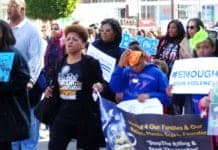
by Bay View Arts and Culture Editor Wanda Sabir
Letter from Birmingham Jail: Dr. King’s message for 2022 with Dr. David Pilgrim – join SpeakOut Jan. 20
In April 1963, when Dr. Martin Luther King Jr. was jailed for participating in nonviolent demonstrations against segregation, eight white clergymen, sympathetic to the Civil Rights cause, issued a public statement discouraging protests.
They argued that change needed to take place through the courts and legal system rather than in public dissent. Dr. King’s response was the powerful “Letter from Birmingham Jail.”
Join SpeakOut on Thursdsay, Jan. 20, 2022, to commemorate Dr. Martin Luther King Day as we host Dr. David Pilgrim to discuss King’s discourse that challenged white moderates 57 years ago and how his message still resonates today. Dr. Pilgrim will explore the historical context of the letter and its relevance amidst the rise of white supremacist organizing and violence around the country.
Dr. David Pilgrim is best known as the founder and director of the Jim Crow Museum, the nation’s largest publicly accessible collection of more than 20,000 racist objects, located at Ferris State University, where he serves as vice president for diversity and inclusion.

His books include “Understanding Jim Crow: Using Racist Memorabilia to Teach Tolerance and Promote Social Justice,” which explains the museum’s vision and work and how the objects are used as tools to teach about race, race relations and racism. Register for his talk here.
Meet the authors at the San Francisco Main Library, Jan. 19 and 22
At the San Francisco Main Public Library at 100 Larkin St., San Francisco, on Wednesday, Jan. 19, at 6 p.m., Author: Dr. Rebecca Hall, “Wake: The Hidden History of Women-Led Slave Revolts,” In “Wake: The Hidden History of Women-Led Slave Revolts,” Dr. Rebecca Hall details her search to find the stories of women warriors left out of the historical record.
In this conversation, we discuss her practice, which she calls “ancestry in progress,” honoring enslaved women’s resistance for an empowered present that imagines resilient Black futures. You can watch it on YouTube.
At the San Francisco Main Library on Saturday, Jan. 22, at 2 p.m., hear Said Shaiye read from his new book “Are You Borg Now?” After the reading, Shaiye discusses the book, with an audience Q&A to follow.
“‘You gotta find reflections of yourself however you can to survive this country,’ writes Said Shaiye in this innovative Afrofuturist memoir. ‘Are You Borg Now’ cyphers with trauma through a poetics of refusal via hard and beautiful language.” – Douglas Kearney, Author of “Sho”
Winter reading recommendations
Winter is a time to reflect and access. What better way to do than this with a good book? I had an opportunity to speak to Chloe Dulce Louvouezo, – Wanda’s Picks Radio, Nov. 17, 2021 – author of “Life, I Swear: Intimate Stories from Black Women on Identity, Healing and Self-Trust.” It is an excellent work with intuitive prompts one can apply to one’s own life and vision for wellness.

I had a wonderful time at the virtual Bay Area Book Festival last year – it was one wonderful author panel or talk after another. I was also able to have the event founder and organizer on my radio show to give highlights and tips.
‘Transcendent Kingdom’ by Yaa Gyasi, 2020

There were several discussions with African Disapora authors. One of my favorites, Yaa Gyasi, is the author of “Transcendent Kingdom,” a 2020 novel, the story of immigration and fitting in, science and addiction.
Is there a way to find and isolate the gene that makes some people more susceptible than others to addiction? A story of grief and loss and when there is no container to hold the pain. It is not as esoteric as all this, but it is a journey. An African family in the Deep South who worship with racists who make fitting in difficult, yet the African mother whose idea that America was better than home – admitting her error drives her mad.
To everything there is a cost. Yaa Gyasi’s sophomore novel asks: Was it worth it? It is a mother daughter story. It’s a sister big brother story. It is a fatherloss story. It is a Diaspora story. All I can say to these characters is: Why stay where you do not belong?
However, once one leaves home, she cannot always return. Home changes in our absence as we wander or drop anchor where we are.
Wayétu Moore’s ‘The Dragons, The Giant, The Women’
In Wayétu Moore’s “The Dragons, The Giant, The Women,” a lovely memoir, we see another option. The memoir told in the voice of a 5-year-old whose life changes drastically when, just after her fifth birthday, war starts in Liberia.
The story of escape, fear, loss and rescue is dramatic especially through the eyes of a child who hears “drums” – bullets – in the woods without realizing the danger.
“Why is everyone asleep,” Wayétu asks as the family makes their escape from Monrovia. “They are asleep,” [her father says]. “You cannot sleep right now, because we have to go see Mam.”
First there were only a few, sprinkled here and there, surrounded by dark red puddles. Then on some roads there were many. I saw an old man and woman, I saw some boys, some men, then I saw a family resting – a mother and father and four children – surrounded by a deep red color, their clothes scattered around them” (p. 48).
A family of girls, the children save their dad, who looks like one of the ethnic groups killed on sight. This feat is just one of the many magical heroic instances in the story.

We see city life contrasted with the village where they are safe. The children learn their ancestral village language – Vai – as they make friends with the children. We see the power of love: The mother studying abroad for her graduate degree steps up to save her family, while Moore’s dad has to leave the safety of the village when one of his girls gets sick. He returns safely and she gets well. However, everyone is not so lucky, and sorrow visits the paternal village.
Once in the United States, we see how assimilation acts like a poison in this Liberian family and attempts to turn the girls against their African mom and dad. However, this African girl’s educated Mam is not having it.
despite these small odds for rescue or hope, love does save the day
However, at the center of the tale is that of Black wom(b)en magic and how these nightmares that haunt the narrator through her childhood into adulthood until finally she is able to return home and find the rebel soldier who saves her family.
“’They’re coming for us!’ I belted and cried, attempting to gain footing to ease the blood from escaping my knees.
“’Run. They’re coming! They’re coming for us! Run! I shouted against the resonating cackles. I turned around again and a rebel’s heartless face and eyes, his cruel lips and tongue, were in my face … I felt his hand grab my dress’” (p. 114).
“I was dreaming, I realized, and had somehow woken up everyone in the house with my screaming. I rubbed my eyes to see them clearly. They stood watching me. I sat up in bed and Mam and Papa finally came toward me with outstretched hands, careful as though I had been newly injured and they were afraid of breaking any more bones” (p. 114).
A true story, the tale reads like poetry, which makes the sadness not vanish, rather settle around us – compassion stirred for the children who are captured by demons and then hypnotized. Yet, despite these small odds for rescue or hope, love does save the day here and it is because of one brave soldier girl’s act of kindness, who helps this family escape death – perhaps for her family whom she could not save.
‘Sojourner Truth: A Life, A Symbol,’ 1996, by Nell Irvin Painter
“Sojourner Truth: A Life, A Symbol” is a classic. In this wonderful text, Painter juxtaposes Truth against fantasy and myth. It is a great book for those persons who have read Truth’s “Narrative of Sojourner Truth: A Bondwoman of Olden Time” and perhaps also know her “Book of Life,” which is excerpted in the Schomburg Library of Nineteenth-Century Black Women Writers, edited by Henry Louis Gates Jr., 1991.
Hers was one of the earlier published writings by a Black woman. Truth was a generation older than Harriet Tubman and a contemporary of Frances Ellen Watkins Harper, poet, novelist – “Iola Leroy” – educator and suffragist, and Harriet Jacobs, formerly enslaved author of “Incidents in the Life of a Slave Girl.”
‘My Soul Has Grown Deep: Classics of Early African American Literature,’ edited by John Edgar Wideman, 2001
In this wonderful volume, John Edgar Wideman has assembled both known and rare stories of African American excellence as told by them. It is a rare instance to hear Black people tell their own stories from such a varied perspective, yet here they are, from Richard Allen, founder of the AME Church, Phyllis Wheatley to Jarena Lee, Allen’s contemporary – she also a preacher or spiritualist – from Sojourner Truth and Olaudah Equiano to Frederick Douglass, Nat Love, cowboy and frontiersman – whose story I had not known – from Booker T. Washington and Ida B. Wells to W.E.B. DuBois, James Weldon Johnson and Paul Lawrence Dunbar.

The author’s lovely introduction to the collection as well as his chapter summary biographical essays to these full length works makes this investment an important document for those interested in foundational American history texts.
In Wideman’s elegant prose, he writes: “The entries in this collection … have been chosen because they can speak for themselves, because they stimulate dialogue, because individually and as a group they address the bottom-line issue of survival, the still unresolved question of America’s identity.
“If we read attentively, listen to the voices preserved here, perhaps we’ll learn how each of us, consciously or not, is implicated, enmeshed in the contradictions, ironies, the precarious successes and heartbreaking, body-crushing failures of a so-called ‘democracy’ in which some are always more equal than others” (p. 9).
Honoree Fanonne Jeffers’ ‘The Love Songs of W.E.B. DuBois,’ 2021
Honoree Fanonne Jeffers’ first novel “The Love Songs of W.E.B. DuBois” – 797 pages, 2021 – is a great saga. I wondered as I read this book about the trauma and sexual violence of enslavement and its aftermath then to now and how secrets harm both the one who is silent and those who need to know.
Add to this cocktail colorism and see how love doesn’t protect or erase the damage racism does to the psyche of the “dark child.” Why do people “pass” or pretend to be something they are not, even when the color of power is that of the perpetrator?
important lessons are forgotten and the next generation has to learn them again
We traverse several narratives in “Love Songs,” a lament to the tragedy of enslavement and this virus which once leeched into the blood and bone spreads rapidly. Despite shared lineage, pillage and destruction lead the way as acquisition – land, goods and people, people as goods or tinder destroy lives generations into the future.
We meet these cursed children who walk blindly into covered traps.
There were so many times when I had to close Jeffers’ book and take a walk. Told through the lens of a contemporary incest survivor, we see how secrets can’t save and that loss is the consequence of holding one’s peace. And is it really peace when the silence itself suffers?
What won’t we do for love? We see how aberration changes and mutates, the sins of fathers and grandfathers are passed on like an inheritance, more accursed.

We learn of magic and wickedness and how families are split apart and important lessons are forgotten and the next generation has to learn them again. Damn. What a waste too!
We learn of redemption and forgiveness. Sometimes a person forgives just because they can’t stand the pain of memory. Holding onto grief and anger is a noose that won’t let the survivor go until she removes her neck from the tourniquet. Hum. For some it’s a lesson learned too late.
I tried skipping ahead and then realized that it wasn’t possible. Jeffers has crafted a litany that demands an audience listen to the complete overture in the order presented. So I stayed up late, took breaks and ended up getting through the book in just a few days.
A family legacy is a lot to carry when one has not looked into the luggage before she picks it up.
Well-researched – one thing to note is the internecine connections in one family between the indigenous people of the land, Africans enslaved and free and Mexicans from late 18th century to the present. These characters are Southern born. It is a landscape most have left; however, these Black people choose to stay. It is their homeland.
There are three girls, dad a physician, mom a high school teacher, great uncle a historian at a historic Black college founded by Black women. The youngest daughter Ailey tells the story when we land in her epoch. The novel traverses the generations until finally we end up in the same universe.
Don’t hold your breath, it takes about 500 or so pages to get there. However, the story is not hard to follow, just follow.
DuBois, a flawed DuBois, a humanized DuBois, joins us on the excursion, each chapter opens with a song or his commentary. The book does not literally sing to us unless we reflect on “Souls of Black Folk,” the loss, the tragedy that is life for Black America.
This tragedy is not only out there, it lies behind closed doors in the unexamined life – the lives of a middle class Black family that has not examined its secrets, which leak into the ground water and contaminate the little ones, the innocent children who grow up to be dysfunctional adults.
A family legacy is a lot to carry when one has not looked into the luggage before she picks it up. Ailey picks the suitcase up and puts it down and picks it up again. She loves her sisters, especially her big sister, Lydia Claire Garfield, born 1966.
“Love Songs” is how between Ailey Pearl Garfield, born 1973, and her Great Uncle Jason Thomas “Root” Freeman, 1907, the two are able to unpack the suitcase so that no one else has to be harmed. It is a great unraveling. The story also shares how the dead are not really gone, that we really are our ancestors.
Bay View Arts and Culture Editor Wanda Sabir can be reached at wanda@wandaspicks.com. Visit her website at www.wandaspicks.com throughout the month for updates to Wanda’s Picks, her blog, photos and Wanda’s Picks Radio. Her shows are streamed live Wednesdays and Fridays at 8 a.m., can be heard by phone at 347-237-4610 and are archived at http://www.blogtalkradio.com/wandas-picks.

 Store
Store







